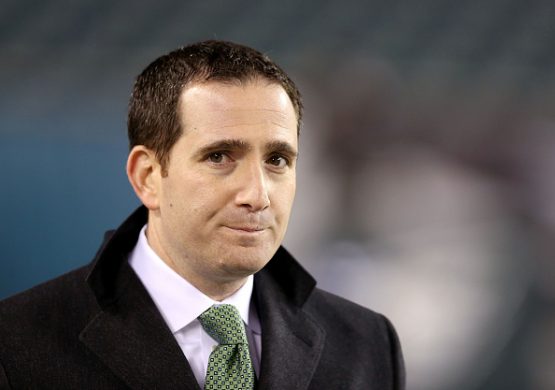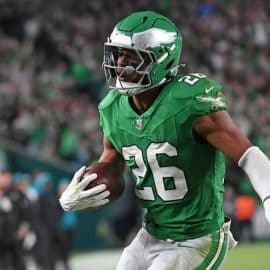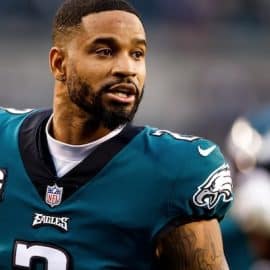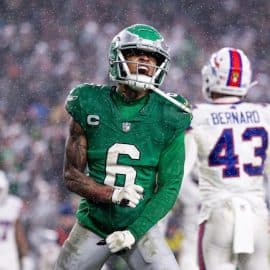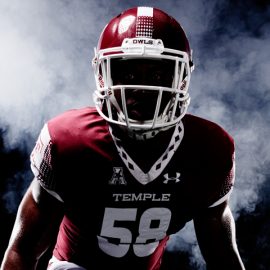It’s almost seven (7) years to the day that the Eagles played the Patriots in Super Bowl Thirty-Nine… the date was February 6, 2005, in Jacksonville, Florida. The Patriots hammered the Birds pretty badly that day despite the closeness of the final score, 24-21…
Thanks to archivist and writer Seth Wickersham of ESPN, we have this anniversary observation to refresh our memories of what really went down that fateful day. It awakens old feelings in me of wanting my team to win so badly I allowed all the potential joy of entertainment in the game to be sucked out of my soul. I became a caged animal in my own living room. I was unaware of the fine line necessary between entertainment and anxiety to maintain a healthy “brimidity index”. I will never make that mistake again.
“Donovan McNabb looked the part of a winning quarterback after Super Bowl XXXIX. He looked good. Except for his bottom lip. It was bleeding. Bad.”
“He tried, you know? The slick tan suit, the snakeskin kicks, the brown vest, the perfect tie, cooling off with a swig of fruit punch Gatorade, rubbing the biceps of a right arm that just threw for 357 yards and three touchdowns. But “Live”, in front of the cameras, there was blood on his mouth. And so as he answered questions after his first Super Bowl — and first Super Bowl loss — McNabb’s postgame look served well for the game he played. He looked sharp, but for his lip. And he played well, but …”
—Seth Wickersham
It’s hard to criticize McNabb’s exhibition in Philadelphia’s 24-21 loss to New England. He played well enough to give Philly a chance to win its first Super Bowl. And he played badly enough to end the best season of his career with the same question that has dogged his career: Is he accurate enough to win a championship?
The numbers show that McNabb completed 58 percent of his 51 passes that Super Bowl Sunday, a percentage that is roughly square with his career mark. But it’s a rate that’s low for a 28-year-old veteran who had played his entire career in a quarterback-friendly offense. McNabb gave Super Bowl XXXIX its best offensive plays. He also gave the game its worst.
Even though McNabb nearly beat the two-time defending champion Pats alone, he was never really on his game. Although it was overturned by a smart replay challenge by Eagles coach Andy Reid, McNabb fumbled on the game’s third play. On Philadelphia’s third possession, he sliced New England apart with a 30-yard pass to Terrell Owens that gave the Eagles a first-and-goal at the 8. But on first down, Mike Vrabel dropped him for a 16-yard loss. On second down, he tossed an airball into the end zone that Asante Samuel intercepted. Fortunately, he was bailed out by an illegal-contact penalty on Pats linebacker Roman Phifer.
Unfortunately, he threw an even worse pass, seven yards short of Brian Westbrook and perfectly placed for safety Rodney Harrison, who hustled to the ball, stopped, waited, ordered take-out, looked for former presidents Bush and Clinton in the stands, weighed the musical “talents” of the Black Eyed Peas, yawned, and finally intercepted the pass.
“I don’t think he got frustrated,” said Eagles tight end L.J. Smith. “It just took him a little while to get in rhythm.” When McNabb did, it was brief and spectacular. In the second quarter, he found Todd Pinkston over the middle for 17 yards. Then he hit Pinkston again deeper over the middle for 40 yards. Then, on third-and-goal from the 7, he looked for Owens outside, came back inside, and saw a window to Smith’s hands where everyone else saw a wall. The touchdown put the Eagles up 7-0.
But still, it was shaky. At that point in the game, Philadelphia had two turnovers, had outgained New England 149 to 27, but only had a seven-point lead. “It could have possibly been a blowout,” McNabb said later.
McNabb’s second half started the same as the first, with Pinkston being overthrown and sacks being taken. Then, again, McNabb settled into a short zone, throwing on eight of 10 plays and hitting seven of them, including a 10-yarder to Westbrook to tie the game at 14. At that point, Reid had all but burned his running plays, electing instead to place the season in the hands of McNabb.
What beat Philadelphia was that McNabb started getting jittery with his throws, and Reid started getting ditzy with his playcalling. In the fourth quarter, trailing by 10, McNabb hit Owens with a perfect pass for 36 yards. On the next play, he threw to Westbrook, and we use the term “to Westbrook” charitably. That’s because with his tailback wide-open in the middle of the field, McNabb threw it high and behind, making it impossible for Westbrook to salvage anything, but very easy for Tedy Bruschi to make a falling interception.
Undoubtedly, analysts will praise Bruschi, one of the league’s premier playmakers, for another smart play on a championship defense. But even more of a factor was that McNabb couldn’t make a throw that every successful West Coast quarterback makes on the game’s biggest stage. And McNabb knows it.
“I’m not going to make excuses,” he said.
Still, he had a chance late in the game, finding himself in the same position as Jake Delhomme and Kurt Warner before him — rallying his team in the fourth quarter against the Patriots. But what followed was a strange and lousy drive, if indeed a lousy drive can end in a touchdown. With 5:40 left, the Eagles took over at their 21 down 10, with all three timeouts. Harrison admitted later he was expecting the Eagles to attack with five wide receivers and throw deep on a Pats secondary that lost starting safety Eugene Wilson. But instead …
McNabb passed four yards to Smith. Then McNabb threw another dump off to Greg Lewis. Then to Owens for another four. Then to fullback Josh Perry for two yards. All the while, the Eagles were huddling up, receivers were walking back to get the play, and as minute after minute disappeared, no one wearing green seemed to grasp the gravity of the situation or the simple math that producing 10 points against the two-time champs is not easy.
Reid, who was calling the plays and wasn’t exactly on the field screaming for his players to show more urgency, said later, “We were trying to hurry it up, but things didn’t work out that way.”
No, they didn’t. It was a painful, hair-gouging 79-yard march that McNabb called a “no-huddle” attack even though all 13 plays featured huddles. Even though it ended in a perfectly thrown 30-yard touchdown pass to Lewis, in a very real way it seemed too little too late. And it’s as if the Eagles offense knew it. When they got the ball with 46 seconds left, McNabb threw a 1-yard pass to Westbrook. Philly was killing itself softly.
After three successive NFC championship losses, McNabb showed in that Super Bowl that he was able to raise his game to a Brady-esque level for spurts. In a Super Bowl poorly played and devoid of any lingering, memorable, snapshot plays, McNabb took on a defense that had dough-popped Peyton Manning and threw for more yards and touchdowns than Brady. Only two quarterbacks have ever thrown for more yards on Super Sunday. But for the next time — and McNabb wholeheartedly believes there will be a next time — the spurts will have to become games.
“He battled his
heart out on the field,” Reid said.
But the blood — and the hurt — followed him off.
With MVP Deion Branch tying a Super Bowl record for receptions with 11, Brady efficiently running the offense and Rodney Harrison sparking a smothering defense, the Patriots (17-2) didn’t need a last-second field goal from Adam Vinatieri this time. But his kick — a 22-yarder with 8:40 left — provided the points that made the difference. The Patriots had their 3rd Ring in four years and were proclaimed a dynasty.
“We did a great job of adjusting during the game,” Branch said. “It was physical; a lot of guys were bumped and bruised.”
“We were too sloppy to win,” receiver Terrell Owens said. “It was great to get back, but we made too many mistakes. We could have won and that hurts.”
Corey Dillon, a newcomer to the championship game, scored the go-ahead points on a 2-yard run early in the fourth period. And when Branch wasn’t catching passes, the Patriots flaunted their versatility by again using linebacker Mike Vrabel to find the end zone. Vrabel had caught TD passes in two straight Super Bowls and has five TDs in as many career catches, not bad for a linebacker — or anyone else.
Brady wasn’t as fluid as he was when he won the MVP awards in the 2002 and 2004 games, but he was 23-for-33 for 236 yards and two TDs. And when the Patriots offense bogged down or turned over the ball, Harrison and his mates forced four turnovers, including a goal-line interception by the veteran safety. The Patriots also had four sacks, making Donovan McNabb look ordinary, even skittish at times.
And while Owens’ return from a seven-week injury layoff was an individual success — he had nine catches for 122 yards — it was not nearly the star turn that Branch made.
Brady actually made a rare mistake, fumbling at the Philly 13 late in the first half. Darwin Walker recovered New England’s first giveaway of the postseason. It didn’t lead to anything for the Eagles, and after a 29-yard punt by Dirk Johnson, the Pats drove 37 yards to tie it at 7. Brady found Givens behind Lito Sheppard in the right corner of the end zone for a 4-yard score, and Givens mocked Owens’ wing flap after the touchdown with 1:10 remaining in the half…
Give the Patriots their due…they used the opening drive of the second half to set the tone for their victory. While New England handled frequent blitzes, Branch caught four passes for 71 yards on the series that ended with Vrabel’s TD. The Eagles responded with a 74-yard drive. McNabb whipped that 10-yard pass over the middle between two defenders to Brian Westbrook for the TD.
Still, as winners always do, the Patriots reasserted themselves, effectively using screen passes against a tiring defense. Even when Eagles defenders shouted to each other to watch for the screen, New England made it work, particularly on Kevin Faulk‘s 14-yarder that preceded Dillon’s 2-yard run to make it 21-14. And after Vinatieri’s chip shot to make it 24-14, you know how it turned out…
ESPN’s Randy Mueller:
| Mueller: Laying it on the lines |
|---|
| The game was somewhat in doubt until the end, but it was decided long before the final gun. From the middle of the second quarter on, the Patriots’ offensive and defensive lines controlled the play at the point of attack on both sides of the ball. I say this with all due respect to Patriot safety, Rodney Harrison (seven tackles, one sack and two INTs).
I thought they created a new line of scrimmage by getting push into the Eagles’ backfield when the Eagles had the ball. And the Patriots established a new line of scrimmage two yards behind the Eagles’ defensive line when using a pounding running game with backs Corey Dillon and Kevin Faulk. This was done at the critical part of game when the Eagles actually had some momentum.
Other than the usual stellar performance by Tom Brady, the speed and quickness of WR Deion Branch made the biggest impact of any one offensive player. He played bigger than his size and showed great heart and competitiveness to find soft spots against the zone, separation against man-to-man and to also catch in a crowd when he was covered.
And yes, I’ll say it — three championships in four years make up a dynasty, no matter what the era. Check out what Randy had to say during the game in The Show |
Add The Sports Daily to your Google News Feed!

